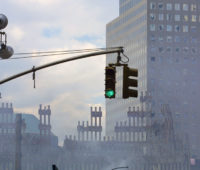Recent events have shown all too clearly that one form of anti-Americanism, the virulent and apocalyptic version that inspired the terrorists responsible for September 11, can lead to horrors of enormous magnitude. It would be foolish to assume, though, that every time an individual shouts an anti-American slogan or takes part in an anti-American protest […]
Terrorist attacks on and since September 11th have stimulated public soul-searching, military and diplomatic responses, and efforts to reform public policy. Both the attacks and responses to them have raised a host of questions about social organization, basic social institutions, how people mobilize amid crises, and how differences of culture and politics shape conflict and cooperation.
This website features an extraordinary and still-expanding collection of essays by leading social scientists from around the country and the world. These are efforts by social scientists to bring theoretical and empirical knowledge to bear on the events of Sept. 11, their precursors, and what comes after.
We have asked the authors of these essays to write against two-week deadlines. Much to their credit they have obliged, even when it is difficult to come by sure knowledge in a time of quickly changing circumstances.
These essays are intended as resources for teachers—especially college and university instructors—who want to address the unfolding events in their courses from the perspectives of the social sciences. We hope they may also serve journalists and others who seek a guide to academic knowledge related to these events. Not least they are for all of us who seek deeper understanding in troubling times.
Ten years after these essays were published, contributors to After September 11 were asked to reflect on what they wrote and to explore what had changed and what remained the same since those harrowing times, resulting in the essay collection 10 Years after September 11.
Trading Sites—Destroyed, Revealed, Restored
by Daniel BeunzaAbstract How did companies at the Trade Center respond to the destruction brought about by the attack on September 11th? In this paper we look through the concrete and glass facade of the twin towers into the socio-technical networks of people, machines, and ideas that constituted the trading rooms. We follow the traders of an […]
After the WTC Disaster: The Sacred, the Profane, and Social Solidarity
by Janet Abu-Lughod…. What concerns me most about the World Trade Center disaster is the way the social, not the urban, fabric was temporarily reconstructed in the immediate aftermath. Urbanists have a knee-jerk response to “community.” It is a “good” that should be encouraged and nurtured. And in the short run, it was absolutely essential. Some of […]
Beyond Conflicting Powers’ Politics
by Luiz Carlos Bresser-PereiraIt was not only the Cold War that ended with the events of September 11th, but also the centuries’ old Conflicting Powers’ Politics. While the conflict between the United States and the Soviet Union ended in 1989 with the collapse of one of the contenders, international policymakers and analysts continued to behave as if the […]
Guarding the Gates in a World on the Move
by Aristide ZolbergAlways on the lookout for opportunities to press their case, anti-immigration advocates lost no time after the attacks of September 11. As one of them pointed out in testimony before the Senate, It seems clear that the 19 terrorists of September 11 were all foreign citizens and entered the United States legally, as tourists, business […]
One Size Doesn’t Fit All: Addressing Diversity in the Needs and Development Capacities of Afghan Women, Short and Long-Term
by Margaret MillsAs Barnett Rubin has persuasively argued elsewhere on this website, human security is the key issue linking Afghanistan’s ongoing institutional melt-down, amidst the entanglements of exploitative geopolitics, with Americans’ and Europeans’ own intensified focus on safety and economic security in the aftermath of Sept. 11. Also on this site, Saba Gul Khattak has represented how […]
U.S. Foreign Economic Policy After September 11th
by Barry EichengreenUnquestionably, the events of September 11th have reshaped the debate over globalization. A trend that many economists characterized as irresistible suddenly appears less so. Foreign assembly operations have become less attractive to U.S. corporations now that there is the fact, or even the danger, that their trucks will be stuck in mile-long queues at the […]
The Predicament of Diaspora and Millennial Islam: Reflections in the Aftermath of September 11
by Pnina WerbnerIntroduction One intellectual response to September 11 has been an outpouring of scholarly commentaries, each in turn suggesting an interpretation of September 11 from a particular personal and disciplinary angle. In the present paper I reflect, like these other commentaries, on the impact of September 11 from my own scholarly perspective, that of an anthropologist […]
The Globalization of Informal Violence, Theories of World Politics, and “The Liberalism of Fear”
by Robert O. KeohaneThe attacks on the United States on September 11, 2001, have incalculable consequences for domestic politics and world affairs. Reliable predictions about these consequences are impossible. However, it may be worthwhile, even at this early point, to reflect on what these acts of violence reveal about the adequacy of our theories of world politics. In […]
The Shifting Grounds for Transnational Civic Activity
by Jeffrey Ayres and Sidney TarrowSince the terrorist attacks rocked the United States on September 11th, for most Americans the state has become a welcome buffer against the anxiety and uncertainties of a new age of biological attacks. This has had a profoundly negative effect on the transnational activists who challenged neoliberal globalization in the late 1990s. As the “rally […]












